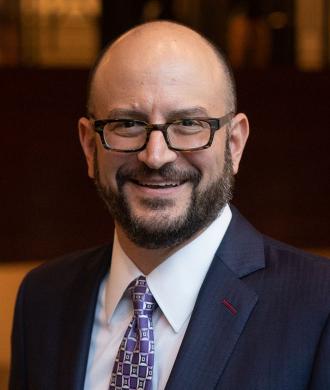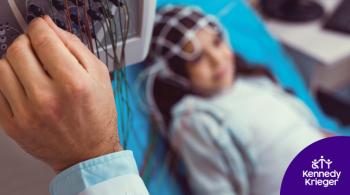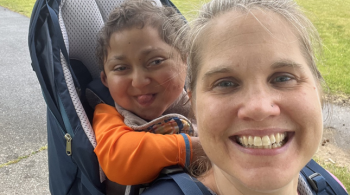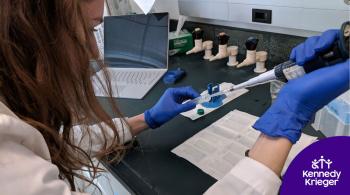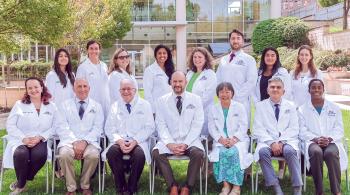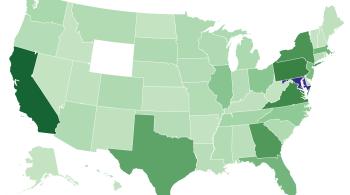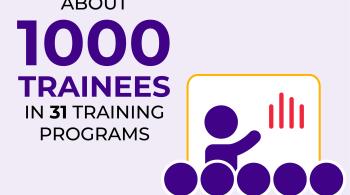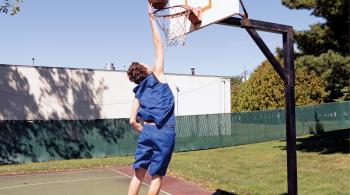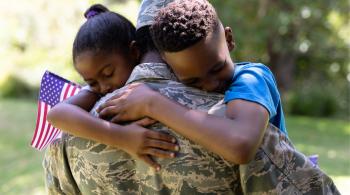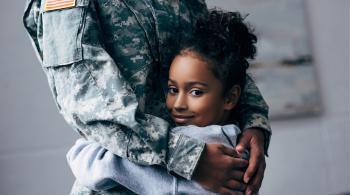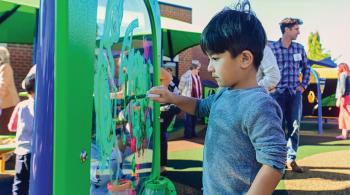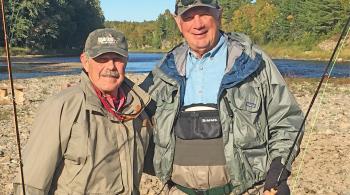Cancer Treatment in Children
Dr. Bradley Schlaggar, president and CEO of Kennedy Krieger Institute welcomes Dr. Lisa Jacobson, a pediatric neuropsychologist and Dr. Lisa Carey, an education specialist, to discuss the late effects of cancer treatment on children, especially as it relates to school and learning.
Speakers for this month's episode include:
- Dr. Brad Schlaggar - President and CEO of Kennedy Krieger and professor of neurology and pediatrics at The Johns Hopkins University.
- Dr. Lisa Jacobson - Faculty Neuropsychologist, Kennedy Krieger Institute
- Dr. Lisa Carey, Education Specialist, Kennedy Krieger Institute
Here are helpful links for people who wish additional information:
- The Oncology Clinic at the Department of Neuropsychology
- Cancer Survivorship and Schooling Resources
- Cancer Survivorship and Schooling Research Projects
- Hospital Education Liaison Program at Kennedy Krieger Institute
Learn More About Our Featured Speakers
Learn More About Our Featured Speakers
View Episode Transcription
Dr. Brad Schlaggar (BS): Welcome to Your Child's Brain, a podcast series produced by Kennedy Krieger Institute with assistance from WYPR. I'm Dr. Brad Schlaggar, pediatric neurologist, the president and CEO of Kennedy Krieger Institute. Over the past six decades, the survival rates for children with cancers of all kinds have improved dramatically. In the 1960s for example, a five-year-old girl with acute leukemia had a roughly 15 percent chance of surviving to her 10th birthday and less than 10 percent chance of making it to her 15th birthday. Now, rates of survival are around 90 percent, which is reason to celebrate. Of course, we do want that number to be 100 percent. Many children who survived their cancer and its treatment must contend with what is referred to as late effects of pediatric cancer. Pediatric cancer centers now have specific clinics devoted to those late effects. While late effects of cancer can impact virtually any organ system in the body, it turns out that the brain is particularly implicated and not just for cancers that involve the brain directly. An estimated 30 to 40 percent of pediatric leukemia survivors for example, have clinically significant brain related effects that include challenges with cognition, mental health, academic performance, and other consequences. I will share that as the parent of a child who is now nearly seven years out from his acute leukemia diagnosis, this is a topic that hits very close to home. Today I'm joined by two of my extraordinary colleagues at Kennedy Krieger; doctors Lisa Jacobson and Lisa Carey. Dr. Jacobson is the director of research, as well as a licensed psychologist and pediatric neuropsychologist in the Department of Neuropsychology at Kennedy Krieger. She's also the co-director of the Center for Innovation and Leadership in Special Education. In addition, she's an Associate Professor in the Department of Psychiatry and Behavioral Sciences at the Johns Hopkins University School of Medicine. Dr. Carey is the assistant director of the Center for Innovation and Leadership in Special Education, as well as an education specialist in the Department of Neuropsychology at Kennedy Krieger. In addition, she serves as the school liaison for Kennedy Krieger's Hospital Education Liaison Program or HELP, which currently serves patients seen in our Neuropsychology, Oncology Follow-up Clinic and the Sickle-Cell Neuro-Developmental Clinic. Welcome, Lisa and Lisa. Lisa Jacobson, let's start off by defining the problem. What do we mean by cancer-related neurocognitive impacts, which is one of the late effects of pediatric cancer? How common is it in children who are cancer survivors?
Dr. Lisa Jacobson (LJ): Neuro-cognitive impacts of cancer, broadly stated, simply means changes that parents or teachers or individuals notice in children's thinking, remembering, paying attention, things like that. What we know is that because children's brains are actively developing, it's very different than effects that we might see of cancer treatment in adults. Children's brains are more vulnerable to disruptions to their function, whatever that disruption might be. In this case, we're talking about cancer specifically and that can result in persisting effects over time. As development continues and the brain builds or layers on top of that initial injury or impact. In terms of frequency, you've mentioned the rates for acute lymphoblastic leukemia, we know that somewhere between about half and nearly all of pediatric cancer survivors might experience cognitive effects after their diagnosis and treatment. With that being more common in brain tumor survivors than in blood cancers for example.
BS: Is the problem due to the cancer, the treatment or both?
LJ: The short answer is both absolutely. It depends on the type of the cancer, it depends on the location of the cancer, and it depends on the treatment. We also need to think about the fatiguing effects of undergoing chemotherapy or radiation, which then can contribute to or worsen some of these difficulties for children who are trying to undergo school or continue school while they're having their treatment. With regard to the effects of cancer specifically, we know that tumors in the brain can have both location-specific effects depending on where they are and what part of the brain is impacted and general effects if they grow a little bit larger or a lot larger and are in a location that might obstruct cerebral spinal fluid or the fluid that is surrounding the brain in the spinal cord. That can result then in hydrocephalus or too much fluid that's not able to drain out of the brain and has its own effects on learning. When we think about treatment for cancer, we think about neurosurgery, we think about chemotherapy, we think about radiation and all of these are lifesaving and really important and they all have their own set of impacts on the brain.
BS: What kind of cognitive issues do you see? I think we can talk about domains of cognition like executive function, language, attention. What do you see or maybe what don't you see in terms of the cognitive impacts that are clinically evident?
LJ: I think most commonly across cancers, the most frequent things we see are processing speed differences, challenges with attention regulation and executive function difficulties. Those are most common with regard to processing speed. Children treated with central nervous system directed therapy, as in the case of acute lymphoblastic leukemia for example, these children are more likely at times to show a slower work speed, especially if it involves fine motor skills like typing or writing. Sometimes even their thinking skills can be a little bit slower so that children might need more time to generate responses or thinking about what they want to say on a particular task, especially as those are more complicated. The attention concerns that we see can be similar to the inattentive symptoms you might see in developmental ADHD or attention deficit hyperactivity disorder. Some difficulty focusing, tendency to be distracted, difficulty organizing, difficulties regulating the child's effort relative to the needs and supports that are available in their environment. Then more broadly, when we think about executive function, that's a set of cognitive skills. It's important for regulating your actions and your affect or your emotion and your behavior and core components of EF include things like working memory or holding information long enough to use it, like following multiple step directions in the right order without forgetting anything. Inhibitory control or inhibition controlling or withholding automatic responses or inappropriate responses for that setting. Then flexibility, so being able to shift your approach to a problem that's not working or adjusting to changes in your day or your schedule. In survivors, we tend to see these weaknesses, most commonly in working memory and potentially also in some of those higher-level skills that dependend on those core components of working memory, inhibitory control, and flexible thinking.
BS: You're a neuropsychologist or pediatric neuropsychologist, how do neuropsychologists go about assessing cognition, all those domains that you just described? Maybe talk about the discipline of neuropsychology and the approach that you take to understanding whether a patient has cancer related neurocognitive impacts.
LJ: Neuropsychology is considered to be the study of brain behavior relationships. Broadly, assessment of how brain-based conditions for injuries affect the ways that we think and learn and behave. Regardless of condition, we use a standardized assessment approach that comprehensively examines multiple domains. These are things like intellectual reasoning ability, visual spatial skills, language skills, learning and memory capabilities, fine motor coordination and dexterity. All of these things, in addition to the attention and executive function or EF, that we just talked about. These are all assessed through standardized measures in which we can compare a child's performance to that of their same age peers in order to help us determine whether their skills are developing the way that they should. Since children's brains are still developing so they're a bit of a moving target, pediatric neuropsychology in particular, also can consider the effect of time in development. Whether a certain condition or an injury has affected a child early versus late, and how that impact might evolve over time for a child, depending on where they are in the course of their development and how old they are when we see them for that assessment. In the case of cancer in particular, we try to use a standardized approach that examines domains we expect based upon the literature, based upon the work that's been done in survivorship areas that we know to be affected.
BS: Lisa you're talking about an important factor of the developmental context. How do factors like age of diagnosis and type of cancer and type of treatment influence the kind and severity and duration of the cognitive effects we're talking about, and along those lines do the more personalized treatment approaches that have emerged like CAR T therapy reduce the risk or do they introduce their own risks for these neurocognitive effects?
LJ: What we know from the research evidence is that the earlier a child experiences cancer, the more likely they are to have their subsequent development affected over time and those difficulties that impact on development is more likely to persist over time. Positively, the research that has shown this to us has also led to changes in treatment so that now there are radiation avoiding strategies for children who have brain tumors who are under the age of three for example. One of the concerns we have though is that conditions like acute lymphoblastic leukemia typically are diagnosed during the preschool period and so for many individuals, their age results in a need for lots of early treatment that is addressing the cancer as you mentioned, survivorship rates are quite high for leukemia which is wonderful but many of those children have long-lasting effects because they were treated so early and because their treatment was directed at their central nervous system in terms of development. In terms of personalized treatments, we have some evidence that's emerging now that proton radiation for example, versus more traditional photon radiation may result in less severe neurocognitive impacts for children. We still need the long-term data we don't have that yet but it is seeming promising. Something like CAR T-cell therapy is also a promising option. One of the challenges with looking at those data are that it's currently used often as an adjuvant, an extra or a salvage therapy, so if a child has progressed with their cancer through other treatments. It's very difficult to disentangle the effects of something that you've given after multiple other treatment alone versus if that were the only treatment they had received. I think the jury is still out on CAR T therapy and even potentially on the proton beam long-term effects.
BS: What do we know about the actual mechanisms? Why are their effects on the brain, for example even when the cancer doesn't involve the brain directly? Do we have a deeper understanding now of the mechanisms that are in play?
LJ: We're building that understanding absolutely. I think one of the largest mechanisms or the most commonly identified mechanism is that of the development of white matter in the brain where we're talking about the connections between brain regions that facilitate efficient function of whatever skill it is that someone is demonstrating. The connections between these brain regions are supported by what's called a myelin sheath around the white matter and that facilitates efficient conduction of impulses from individual neurons or brain cells. This white matter and its associated myelin covering has a really long developmental trajectory. Into your third decade of life, we're not quite finished with our development of white matter, which means there's a lot of time for something to influence the way that it develops and as a result, white matter is very sensitive to injury. Whether it's injury from surgery of resecting a tumor, or whether it's injury from a particular chemotherapy agent, that affects the way in which that myelin sheath develops. We have imaging data looking at children who have been treated with these interventions and it shows long-term persisting white matter injury. That's an example from acute lymphoblastic leukemia, which is a cancer that doesn't affect the brain directly, but the treatments have this impact on the white matter.
BS: Lisa Carey, let's talk about how pediatric cancer and its treatment impact education for children undergoing that treatment. We've been talking about late effects but of course, children are often very ill from the cancer. They miss a lot of school because of the treatment protocols, frequent interactions with the infusion centers and getting both in hospital and out-of-hospital treatment. Then just thinking about our own personal journey are often in and out of the hospital during their treatment journey. How do you take that all into account from an educational standpoint?
Dr. Lisa Carey (LC): When it comes to education, we think about the different components of doing well in school. One is the thinking, the learning, the being able to bring back what you learn, so as Lisa Jacobson just mentioned those things are all impacted by cancer. Then the other piece is being at school and accessing the instruction that's happening though you can't learn something that you didn't have access to and that's why in the world of special education, we focus so much on your access to what we call the general education curriculum and how you're going to access that. What space are you going to be in and as we all learned from the recent pandemic that can happen both virtually or in place. When a child or teen is ill with cancer and they're going through treatment, one of the difficulties is that it's not just that they are maybe not in the place where the instructions going on, it's that they might be too ill to be taking advantage of even something like online learning. We saw a lot of schools come back from the pandemic, from the online instruction and say, oh great, we have this tool we'll just sign you up for e-learning. You'll just do instruction online all day and that doesn't work if you're being going in and out of appointments for treatment or you're too ill after treatment to access that. We look at something called home and hospital teaching or home and hospital instruction, which looks at more of a one-to-one tutoring component and it's not looking at doing a full six hour day of instruction, but doing this focused tutoring piece where they're connecting back to the child to school and looking at what do we have to keep you up-to-date on. That can be difficult, so when kids come back after treatment and they go back into school, sometimes there's some catching up that has to happen but then there's also a change to the way that they're thinking and learning and so we need to take that into account as well.
BS: What kinds of accommodations should be made at home and at school? We talked a bit about virtual approaches, but maybe we can dive deeper into the accommodations beyond that and does it mean that a child who is dealing with cancer treatment and then late effects, should they have IEP, or individualized education program or be considered at some level to have a disability for access to services, and then can you speak to what it really means to be a liaison between the school, hospital, the health care system, the young person, and their family?
LC: Yes. That was a lot of different pieces so I'm going to [LAUGHTER] go through them. The first piece is, can a student who had cancer or is now a cancer survivor be eligible for special education, which is looking at having an individualized education program and the answer is yes. The law, which is the Individuals with Disabilities Education Act that oversees special education actually gives leukemia as an example of a way that a student might qualify for special education and related services under this heading called other health impairment. One little difficulty we have with that is that there is over a decade of research showing that teachers in their education don't get much instruction about how to work with students who have chronic and complex health conditions. That includes cancer, that includes sickle-cell, epilepsy, diabetes, AIDS and HIV. There is a whole swath of things, but we're going to focus on cancer. If a student is having enough trouble with their cognition, what they're thinking, their learning, their memory, their processing speed, all of those things that Lisa Jacobson mentioned earlier, then they might need specialized instruction and they also might need some what we call related services and maybe some occupational therapy if that fine motor processing speed is a little bit delayed now. They might need physical therapy because of the impacts of cancer and treatment, they might need speech and language therapy. All of those different pieces all fit into an Individualized Education Program and students who have all of these impacts, they most definitely can qualify for special lights instruction through an IEP. Students can also get accommodations through what's called a 504 plan, which is under separate set of legislation, and that typically focuses more on accommodations so maybe getting some extra time, maybe taking some extra breaks during the day and it doesn't usually have that instructional piece to it or the related services component. Then in terms of being a liaison, as I said, a lot of teachers just don't get training in meeting the needs of kids with chronic and complex health conditions and so going from the assumption that schools and teachers want to meet the needs of all of the students that they serve and that usually they just need the knowledge and skills to do so, we created our program called the Hospital Education Liaison Program, or HELP to fill in those gaps. We go case by case and the idea is to help the school team understand cancer and late effects and how that impacts a student and then help them to problem-solve. They're meeting the needs of a student so how do we make the school, the instruction, the community, ready for the students to return or ready for them to do well way past when they're done with treatment.
BS: Lisa Jacobson and both of you, let's talk now about ways that we can advise about managing or treating the cognitive consequences of pediatric cancer. Are there medications, is there evidence-based approaches for exercise? More behavioral therapies like cognitive behavioral therapy, for example, specific educational strategies. What are the ways that we know can work for management of these conditions?
LJ: In terms of exercise for example, yes, there is definitely there have been studies that show that activity is helpful in general populations, but also in survivorship populations for improving our physical stamina, mental health, cognition, attention but also that childhood cancer survivors are less likely to get adequate physical activity than their peers, so they're already at risk and improving the amount of exercise has been shown to be effective. When we think about medication, there's also some evidence for safety and efficacy of stimulant medication like methylphenidate to treat the attention problems that are, as I mentioned, similar to the attention problems you might see in children with ADHD. There's also some emerging evidence in young adults more than in the pediatric population for medications that typically target alertness like modafinil for example as opposed to the methylphenidate used to treat attention problems. Then when we think about the behavioral interventions, there's some utility for executive function coaching, so that area of skill building. Although we certainly see more generalizable effects, more lasting effects seen with actual coaching with a person versus computer-based working memory training that has been explored as a hopeful alternative. Before I turn it over to Lisa, one of the things to think about is given the high frequency of anxiety and internalizing symptoms in our survivors of cancer, cognitive behavioral therapy can be certainly be extremely helpful for them. And there are definitely studies that have shown the utility of even group and family-focused interventions like the Surviving Cancer Competently Program that was based out of CHOP. There are definitely a number of behavioral resources that are helpful.
LC: In terms of what we can do in school to improve things like executive function there are emerging evidence-based practices that all seemed to focus on asking guiding questions of students as you're going through rather than saying the next step is questioning a student saying, what do you think the next steps should be because that starts to build that inner monologue of problem-solving and thinking through. Then practicing skills such as inhibiting, so stopping your first initial reaction with younger kids, game-playing has been shown to really help with that. Playing Simon Says, playing no-go game, so something like free stance. What's really great is that a lot of schools are doing these things. They're doing them as movement breaks, making sure that kids can be incorporated and if there's any reason that doing those things in a very physical way might be limiting for a student, you're thinking through what are ways we can adapt to make sure that they're still getting access to this. We also have ways in school of building the self-regulation and executive function skills through mindfulness practices that are really starting to increase in schools. There's growing evidence around that and there's a lot of programming around that as well. Then also just thinking through that, you tend to use those executive function skills that Lisa Jacobson described earlier when things aren't automatic yet, and so building things to be more automatic by practicing, by relying on that memorization that's still a strength typically in many kids that have experienced cancer and cancer treatment. They don't have to use those executive function skills as heavily, can also be a way to work around it. Again, special educators, they're different from [LAUGHTER] the other educator. As a person who was a special educator myself, you might have a social studies teacher who's going through the curriculum, but a special educator is really focused on the how you're learning component and that's something that they can really focus in on to think about, what are the strategies for this individual student that we need to develop so that they can develop these skills on their own, find workarounds if there's a weakness and really leverage their strengths so that they're capable of moving on and being really independent as they transition out of high school?
BS: Lisa Carey, I think it would be really helpful and interesting now that we've had a substantive discussion about the space of late effects and neurocognitive impacts, to share a story of a child with cancer, a cancer survivor, paint a picture of the issues that we are dealing with and the approach to solutions for that child.
LC: Last year, I worked with a patient actually of Lisa Jacobson's, a seven-year-old who had had a brain tumor at the age of two, and that brain tumor had resulted in some hearing loss, a little bit of some vision concerns with just being able to gaze downward, in addition to all of those executive function and emotional regulation pieces we talked about. As Lisa Jacobson said earlier, the younger you are when you have cancer and treatment, the more it impacts you. This particular child had had a brain tumor physically removed through surgery or what we call resection, and had also had chemotherapy. That's a lot of treatment to impact brain development and had it at a very young age. When I became involved in the case, this was several years past treatment and the child was now in first grade. The child already had an IEP, so they are already receiving special education services, but it was under hearing impairment as the code. The focus of the specialized instruction and related services was all focused on the hearing loss component, and not on the other pieces that we saw which were difficulty with working memory, difficulty with inhibitory control, emotional regulation difficulties, and then a whole host of speech, language, and early reading difficulties that were significant enough that Dr. Jacobson gave the patient a secondary diagnosis of a learning disability, and so none of that was there, and part of it was that the school team just didn't understand the scope. They knew that the child had survived a brain tumor, but they didn't understand how several years later that's still impacted them. I first worked with the family to help them understand the policies and procedures of special education, answer any questions they had and then set goals with them. What is it you want to get out of working with me? Then we attended school meetings together, and I provided some just information to the school team. This is the general way in which cancer and cancer treatment impacts learning and thinking and kids and going to school and then here's how specifically in this case, it's working out. By the end of this process and we attended several meetings, we had changed the IEP code to two other health impairment. There was a better health history included in the plan so that future teachers would continue to see this information that it wouldn't stop with that one team. There were intended goals to include reading, writing, getting reading intervention, and just a whole host of additional services that matched better onto that neuropsychological report that showed what the needs and strengths really were. In doing so also built relationships that were stronger between the school team and the family and had the school team feel like they could reach out for additional medical information when questions came up. What's nice about this approach is that we know from teacher education research that teachers retain information about teaching and learning best through case-based learning, which has to do with an individual student. In addition to providing those liaison services, we are providing professional learning opportunities for education teams in the way that we know that they will learn and remember best, and so the next time a student comes into the lives of any educator involved in that process, they will have a lot of background knowledge to pull from and hopefully do a really great job for that next kid.
BS: Powerful story. It really clarifies how consequential understanding these issues are for improving survivorship for children who survive their pediatric cancer. Thank you to our guests for this fascinating and really important discussion. We hope you all have found this information helpful and that you'll consider sharing this podcast and rating it too. You can check out our entire library of topics on your child's brain at Wypr.org, KennedyKrieger.org, Wypr.org/Studios, or wherever you get your podcasts. You've been listening to Your Child's Brain. Your Child's Brain is produced by Kennedy Krieger Institute with assistance from WYPR and producer Spencer Bryant. Please join us next time as we examined the mysteries of your child's brain.

